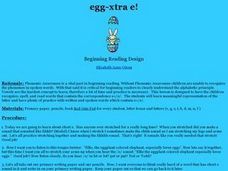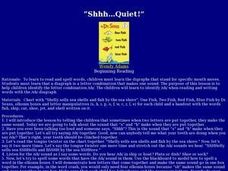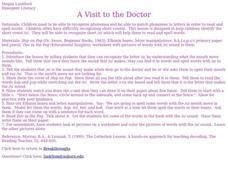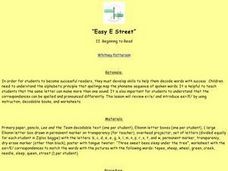Curated OER
Iiizzy is Iiicky Sticky!
Young scholars answer a series of questions about the different sounds that the letter I makes. They observe a picture about a girl and the letter I. They practice a tongue twister with the different sounds of I. They practice writing...
Curated OER
Icky Sticky and Itty Bitty
Students identify the letter i and the sound that it makes in various words and illustrations with the sound /i/. They practice writing the letter I both upper and lower case on paper. Finally, students circle the pictures with the...
Curated OER
BUGS-INSECTS
Students participate in a theme study while teaching primary students basic skills according to Individual Education Plan (IEP) goals in Reading, Math, and Writing. The lesson is concerned primarily with the concept of insects.
Curated OER
That Sums It All Up!
Young scholars review the concept of silent reading. They listen to a story and create a story map of what they hear. Then, they read their own story and map it the same way. This time, they use this story map to write a summary of...
Curated OER
"Open Your Mouth and Say AH!"
Students practice letter and sound recognition of the vowel o=/o/. They study the tongue twister "Tom got a frog from the pond" and the book, "If You Give a Moose a Muffin," by Laura Joffe Numeroff with an accompanying worksheet to master.
Curated OER
Around the World with Bud the Sub
Learners study the u=/u/ correspondence. They explore words with /u/ in them, read a book focusing on /u/ and complete a worksheet. The Play Around the World with flashcards with /u/ words and words that are not /u/ words on them.
Curated OER
Baby Brown Bears
Students identify the letter and phoneme /b/ in written and spoken language. Students practice the production of the /b/ sound through riddles and tongue twisters. They identify the initial placement of the letter and sound using a...
Curated OER
Jack the Fat Cat
Students recognize the short /a/ sound in written and spoken words in this lesson plan. They say a tongue twister which emphasizes words with the short /a/ sound. They then listen to the story "A Cat Nap" and identify the words in the...
Curated OER
Word Family Activities and American Symbols
In this word family and American symbols worksheet, students learn about word families and American symbols. They complete an activity in which they create real and nonsense words by combining sounds of the alphabet with 7 different word...
Curated OER
What Did You Say?
Students recognize the short vowel E in written and spoken language. Through matching activities, they discriminate the short vowel /e/ from other phonemes. Students associate the phoneme with its letter representation and read pseudo...
Curated OER
Fish Wish
Students identify /sh/ sound when reading and writing words with the /sh/diagraph. They practice saying "Shhhh" and then read the tongue twister "She sells sea shells and fish by the sea shore." They complete a worksheet circling...
Curated OER
I Think I Can
Pupils identify the digraph /ch/ in written and spoken language. Students practice the production of the /ch/ sound through tongue twister. They identify the initial and final placement of the digraph /ch/ by reading a story to a partner.
Curated OER
Shhh...the Baby is Sleeping
First graders identify the digraph /sh/ in written and spoken language. After a brief discussion of the independent and combined sounds of the phonemes /s/ and /h/ students practice identifying initial and final placement of the new...
Curated OER
Can You Open the Creaky Door?
Young scholars recognize the short vowel e in written and spoken language. Through matching and listening activities, they discriminate the vowel sound /e/ from other phonemes. Students identify the phoneme and letter in words and pictures.
Curated OER
Author Study: Kevin Henkes
Students use the Internet to access information about author Kevin Henkes and his many books. They read interviews, explore book-related mazes, recipes and activities and complete coloring pages, etc.
Curated OER
Egg-xtra E!
First graders recognize the short vowel e in written and spoken language. Through listening activities, they discriminate the vowel sound /e/ from other phonemes. Students identify the phoneme and letter in words and sentences they write.
Curated OER
Tricky T
Students practice the corresponding phonemes associated with the letter and sound symbol to T. They identify the letter, write it and also identify pictures that display it's beginning sound. Students also interact with the book,...
Curated OER
Shhh! Quiet!
Students become aware that when certain letters are put together in a word they are said with a single mouth move. Through modeling and a variety of guided practice activities they explore the /sh/ phoneme. They read and identify 'sh'...
Curated OER
A Visit to the Doctor
Students recognize the short vowel O in written and spoken language. Through matching activities, they discriminate the short vowel /o/ from other vowel sounds. Students associate the phoneme with its letter representation and identify...
Curated OER
ABC It's Easy as 1..2..3..
Students listen to an alphabet book. They explore initial sounds throught the creation of a classroom ABC book. This lesson requires a program application, "Pixie."
Curated OER
Icky Sticky Mess
Students practice sounding out and writing the letter "i." They listen for the "i" sound in phrases the teacher says. The students then practice writing the upper and lower case letter "i." Finally, they listen to the book "Liz is...
Curated OER
"Easy E Street"
Students investigate how the same letter can make more than one sound. It is also important for students to understand that the correspondences can be spelled and pronounced differently. This lesson will review e=/e/ and introduce ee=/E/...
Curated OER
Ta-Ta- Timer
Learners identify a letter of the alphabet. They recognize this letter in print and in spoken language. The letter and phoneme chosen is the letter t and /t/. They write the letter in both lower and upper case. They read 'One Tiny...
Curated OER
Icky Sticky Tin Man
Students recognize the short vowel i in written and spoken language. Through listening and matching activities, they discriminate the vowel sound /i/ from other phonemes. Students associate the phoneme with its letter representation and...

























